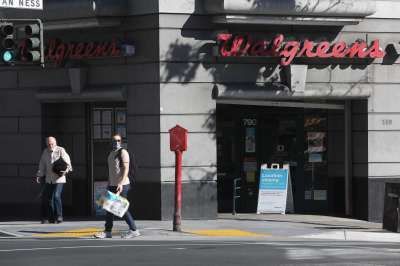Here's what happened after that viral S.F. Walgreens shoplifting video ended

Walgreens has closed 17 stores in San Francisco during the last few years due to shoplifting, the company says.
Lea Suzuki/The Chronicle 2020By now, just about everyone in San Francisco — and the country — has seen or heard about a June viral video depicting a brazen theft in a national retailer’s Hayes Valley location.
As a senior advisor for ALTO, a global provider of strategic support for addressing retail crime, I was directly involved with other ALTO team members on behalf of the retailer supporting law enforcement efforts in catching the suspect. My role behind-the-scenes gave me a unique vantage point, and I am concerned that the public doesn’t have a full picture of the incident and what goes on to prosecute offenders and prevent future crimes. Without this info, false narratives and finger-pointing are distracting us from the nature of the shoplifting and organized retail-crime problem that store employees and customers see daily.
Though it seems cut and dry, retail crime is anything but. To offer a more complete picture of the incident, let’s start with the facts:
The original video shows a man conspicuously stuffing a bag full of merchandise at a Walgreens before riding off on his bicycle. A security guard and citizen are seen recording the incident, and the video was posted on Twitter by a local reporter minutes later. National headlines followed closely behind. But, contrary to what we see on social media, the story doesn’t end there.
The security guard became the subject of online scrutiny for videotaping rather than getting physically involved. The fact is this guard was doing exactly what he was trained to do: attempting to deter crime through presence and commands. When that didn’t work, he observed and reported the incident to the best of his ability. Nothing in a store is worth someone’s life.
With the guard’s report, and because of the determined investigative efforts of the San Francisco Police Department, the suspect was arrested just days later. As it happened, the ALTO team was communicating with the department throughout a crime spree. With the support of ALTO, police connected the suspect in the video with multiple other incidents around the city.
With thorough police work in hand, District Attorney Chesa Boudin’s office had evidence to prosecute the suspect on 15 separate charges — and requested he be held without bail. He remains in jail as of this writing.
Despite the online hysteria and finger-pointing, particularly against Boudin, this was a case of the system working as it should.
However, that isn’t always true.
Without dedicated training and resources by retailers and consistent collaboration between the in-store team, law enforcement and prosecutors, successfully catching shoplifters can be a difficult proposition. In severe cases — like what we saw in this store — organized, ongoing theft is cyclical: Repeat offenders victimize dozens of locations. However, even in highly publicized cases, it can be hard to connect the dots.
Recent viral videos have shown offenders becoming more brazen, and at times, more violent. But many of these cases go unreported. In some cities, because of a shortage of law enforcement resources, police can’t respond adequately to nonemergency retail crime offenses. In some instances, retailers are even fined if they call on law enforcement too frequently.
However, when retailers work to collect evidence — such as videos that go viral — then file complete, accurate reports, it can help slow the cycle of recidivism. These efforts also free up law enforcement to pursue proactive, community-based strategies to prevent crime.
ALTO’s legal team has partnered with Boudin’s office on many other cases dating back to November 2020. Throughout that time, we’ve admired the office’s openness to new ways of addressing this complex issue. For example, Boudin’s office has been receptive to having ALTO attorneys in the courtroom on behalf of our members. This strategy is new to the U.S. and has our attorneys providing support for employees testifying and acting as an advocate for retailers.
In extreme cases like the one caught on video, we believe incarceration is appropriate. However, we share Boudin’s view that minor or one-time offenders may benefit more from treatment for addiction or mental health as the underlying cause for their crime. The end goal should be to break the cycle of recidivism and, in doing so, help make the community safer.
Retailers want safe stores. Customers — and employees — expect and deserve them.
Meaningful and lasting crime reduction, in a progressive manner, can be done. It has been done. And for it to continue to be done, we need to work together on a unified approach that doesn’t end when the video cuts.
Karl Langhorst is a senior advisor at ALTO USA and a retired law enforcement officer and retail asset protection executive.


